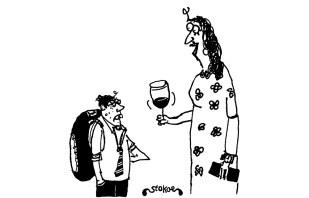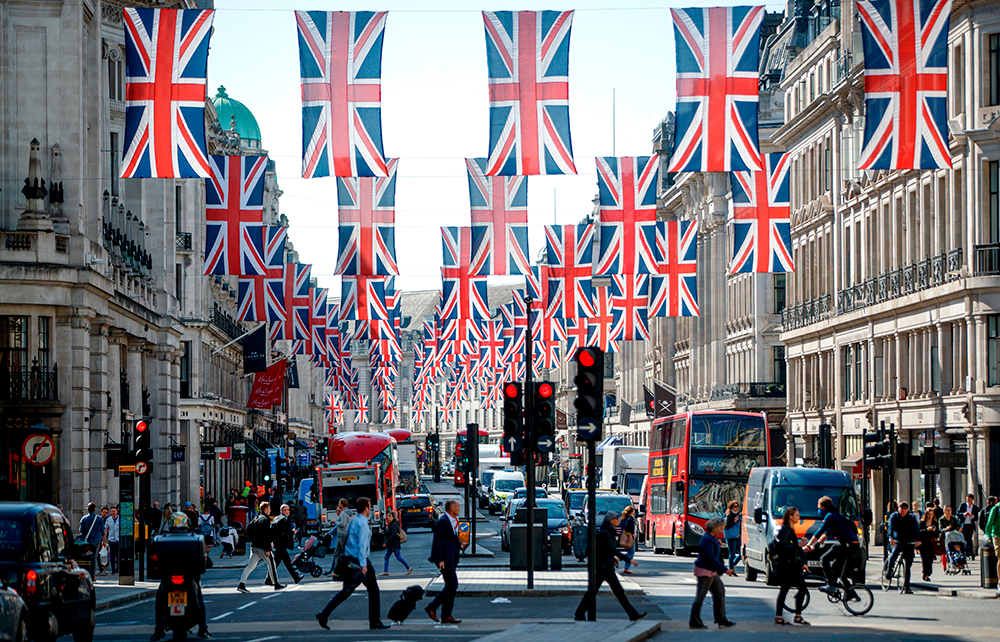I suppose there must be someone somewhere in this nation of ours who was surprised by the news that our fellow citizens have a much lower sense of pride in our country than has ever previously been the case. This apparent fact was reported by the National Centre for Social Research, whose representative did not seem terribly distressed by the findings. In short, only 64 per cent of us have any sense of pride in our nation’s history (down from 86 per cent in 2013) and a little over half of our number are proud of our democratic system.
What do they put in its place, these guardians of Now? Nothing which might bind us together as a nation
The woman from the NCSR said this was all the consequence of a nation ‘redefining itself’ and might have added, but sadly didn’t, ‘from being an homogenous, disciplined and decent nation which once ruled a third of the globe to a fetid open sewer full of morbidly obese, illiterate, tattooed chavs, primitive and neurologically diverse jihadis, sexual perverts, Balkan pickpockets, pink-haired student activists with the IQ of an ill-maintained Indesit fridge freezer, mithering, stupid, self-flagellating, Actimel-swigging middle-class liberals, drug lords from the dusty arid wastes of what was once called Turkestan, weird and troubled men-women and women-men, and excitable hordes from the Maghreb and the Levant who have fled terror and repression in their own lands and now wish to establish both here, inshallah’.
She actually didn’t say any of that stuff, I don’t think – and had she done so would probably now be out of a job. Instead it was just a considered analysis of why this abrupt change had occurred – we are more diverse (yay!) and less enamoured of the past (which was, without question, infinitely superior to the present).
The first and most obvious point to make is that some of that change may be the consequence, directly, of immigration, given that an awful lot of people have arrived here since 2013 and not all of them necessarily genuflect when the names ‘Cecil Rhodes’ and ‘Richard the Third’ are mentioned. Some undoubtedly will have arrived with high expectations, having revered or balefully respected the history of our country. But shall we agree that not all who have come here have love in their hearts for our history and culture – and thus, when asked by sociologists, might well respond in the negative. But despite the enormous numbers of people who have arrived, that by itself cannot account for the extremely sharp decline in the number of ‘Brits’ who believe that our past is something to write home about.
The real reason for that has been the concerted, nihilistic, perverse insistence from a ruling liberal elite that everything our country stands for, or has done, is – by and large – utterly disgusting, something to be thrown on the bonfire of history while we gather around cheering as the flames flicker upwards to consume our past.
In this we are very similar to the Americans, Canadians, Australians and New Zealanders, who have gone through a similar process of re-evaluating themselves and discovered that they are scumbags, the filth of the world, and that it is time to accede to the agenda and cultural mores of the ‘global majority’ (a particularly dishonest and asinine term). This revisionism, which the NCSR alluded to, has been overwhelming and comprehensive and, as with everything else which emanates from liberalism, fundamentally illiberal and absolutist.
You can see this revisionism on your television screens every night via the BBC – but even more obviously in the advertisements on the independent channels which, quite literally, expunge the white Brit from the scene while insisting that we should still buy their awful products, even though they hate us. (Please don’t ever book a flight with Virgin Atlantic. If you feel that maybe you should give them a try, just look at their grandstanding adverts. Go Ryanair or Aeroflot instead, I don’t care. Never fly with Virgin.)

The same revisionism is present in every British quango and statutory body, whether it be the National Trust lecturing us about how wicked British slavers might have been (forgetting that we were the country which pioneered the abolition of that awful sin of capitalism, while the Africans cheerfully continued the practice) or the art galleries, museums and libraries which insist that our past is vile or at best questionable and that we might learn far more from looking at some totem pole crudely fashioned by some Cree halfwit than regarding the majesty of Monet or Caravaggio or Van Gogh. Stale white writers – Shakespeare, Dickens, Eliot and so on. Bin them, they have no relevance to the tyranny of Now. Or at best, traduce their works to emphasise a racial or sexual politics which was never present in the first place, or of marginal importance.
And it is there in our university campuses, a rancid monoculture which cleaves to the post-rational view of society – and even worse in our schools, which have swallowed the absurd and divisive creed of critical race theory. Given this momentous onslaught upon everything in which we once believed – including Christianity and its mild but effective encomiums – it is frankly a surprise that there are any of us left who dare to express a certain pride in our country. This war has been unrelenting and unforgiving: those who don’t fess up to being oppressive straight whiteys are out, for good. The many contradictions which abound in this rewriting of history are glossed over. It is simply that we have no history at all, or that the only history which exists is malevolent.
But what do they put in its place, these guardians of Now? Nothing. No intellectual thought. No credo. Nothing that might bind us together as a nation – because, of course, this new imperative has no time for the nation state. And so we flounder, lost in a discredited entity which has no moral centre and which, with every year that passes, fewer and fewer believe in.








Comments